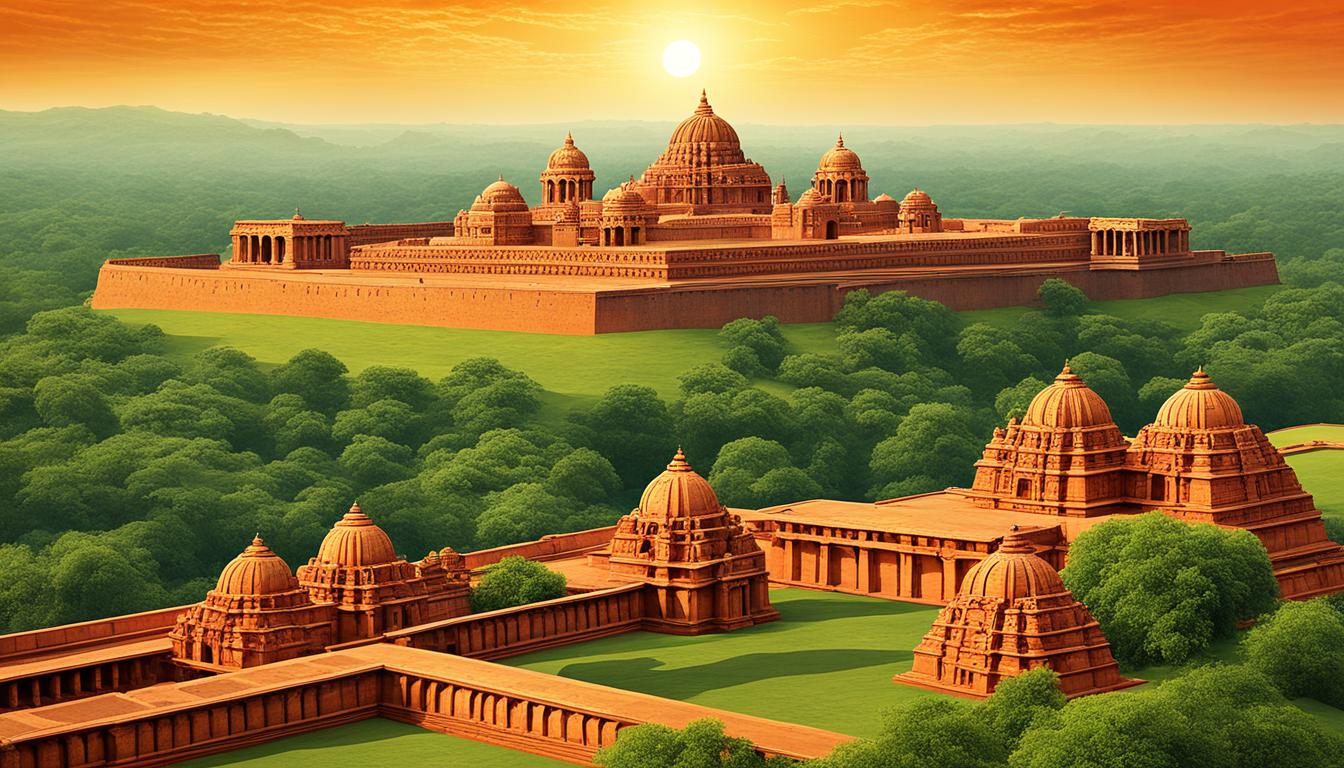Have you ever wondered about the fascinating story behind one of India’s greatest emperors? How did Ashoka, the last major ruler of the Mauryan dynasty, transform from a conqueror to a promoter of peace and compassion? Dive into the extraordinary life of Ashoka and uncover the remarkable achievements, inscriptions, and monuments that shaped his legacy.
Key Takeaways:
- Explore Ashoka’s empire and the significance of his reign in Indian history.
- Discover the early life and rise to power of this influential emperor.
- Uncover the pivotal moment that led to Ashoka’s spiritual transformation and adoption of Buddhism.
- Learn about the impact of Ashoka’s rule on the spread of Buddhism and the Mauryan Empire.
- Reflect on the lasting legacy of Ashoka and his commitment to moral governance.
Early Life and Rise to Power
Ashoka, the famed emperor of the Mauryan Empire, had a humble beginning. He was born in 304 BCE in the city of Pataliputra, the capital of the Mauryan Empire. With Chandragupta Maurya as his grandfather and Bindusara as his father, Ashoka was part of a prestigious lineage.
Despite having several elder siblings, Ashoka emerged as the favored successor to the throne due to his extraordinary qualities and exceptional potential. From an early age, he displayed great intellectual curiosity and leadership skills.
Ashoka’s education encompassed a wide range of subjects, including warfare, statecraft, and philosophy. He received rigorous training in these areas, preparing him for the challenges that lay ahead. His military experience began with accompanying his father, Bindusara, on various campaigns. Ashoka also gained valuable governance experience by administering cities like Ujjain.
The turning point in Ashoka’s life came with the demise of his father. Following Bindusara’s death, Ashoka ascended to power and became the Mauryan emperor. This marked the beginning of an era that would shape the course of history.
In the next section, we will delve into Ashoka’s spiritual transformation and his adoption of Buddhism, which led to significant changes in his rule and the empire.

| Key Facts | |
|---|---|
| Birth Year | 304 BCE |
| Birthplace | Pataliputra |
| Capital of the Mauryan Empire | |
| Grandfather | Chandragupta Maurya |
| Father | Bindusara |
| Education | – Warfare |
| – Statecraft | |
| – Philosophy | |
| Military Experience | – Campaigns with Bindusara |
| – Governance of Ujjain | |
| Rise to Power | After the death of Bindusara |
Spiritual Transformation and Adoption of Buddhism
The pivotal moment in Ashoka’s life was the Kalinga War in approximately 260 BCE. Witnessing the immense suffering and destruction caused by the war deeply affected Ashoka, leading to a profound change in his perspective on violence and conquest. This experience prompted his conversion to Buddhism and his adoption of the concept of Dhamma.
Ashoka embraced the principles of non-violence, compassion, and social welfare, shaping his rule and policies. By following the teachings of Buddhism, Ashoka sought to bring about a moral and ethical transformation within his empire. He believed in promoting peace, harmony, and the well-being of all his subjects.

The Impact of Ashoka’s Conversion
Ashoka’s conversion to Buddhism had far-reaching consequences, both within his empire and beyond. It marked a significant shift in his approach to governance and his commitment to the welfare of his people.
Under the influence of Buddhism, Ashoka implemented policies that prioritized social welfare and the alleviation of suffering. He actively promoted non-violence and encouraged religious tolerance, providing freedom of worship to people of different faiths.
Ashoka’s adoption of Dhamma led to the establishment of hospitals, the construction of wells, and the promotion of religious and cultural exchanges. He also focused on the improvement of trade, agriculture, and infrastructure, aiming to enhance the quality of life for his subjects.
Ashoka’s Legacy: The Spread of Buddhism
Ashoka’s embrace of Buddhism had a profound impact on the spread of the religion, both within India and beyond. He actively supported the establishment of Buddhist monasteries and sent missionaries to spread the teachings of Buddhism to neighboring countries.
The rock edicts and pillar edicts that Ashoka commissioned across his empire served as lasting reminders of his commitment to Buddhism and his efforts to promote ethical governance. These inscriptions conveyed messages of peace, righteousness, and the importance of moral conduct.
The legacy of Ashoka’s transformation and his promotion of Buddhism continue to inspire people to this day. His enduring message of compassion and tolerance serves as a reminder of the power of personal growth and social responsibility.
Impact and Legacy of Ashoka’s Rule
Ashoka’s rule had a significant impact on India, leaving behind a lasting legacy that continues to shape the country’s history and culture. As one of the most influential emperors of the Mauryan Empire, Ashoka’s reign was characterized by his commitment to peace, tolerance, and social welfare.
One of the key aspects of Ashoka’s legacy was his promotion of Buddhism. As a devout follower of Buddhism, Ashoka actively supported the spread of the religion throughout his empire. He built and patronized monasteries, sending Buddhist missionaries to various regions, and fostering a climate of religious tolerance.
Ashoka’s edicts, both rock edicts and pillar edicts, served as lasting historical records of his thoughts, actions, and policies. Engraved in various parts of the empire, these edicts reflected Ashoka’s devotion to justice, morality, and the welfare of his subjects. They provided insights into his principles of governance and his commitment to creating a just and compassionate society.
The spread of Buddhism under Ashoka’s reign had a profound influence on Indian society. Through his efforts, Buddhism gained popularity and acceptance, becoming a major religion in India and beyond. The teachings of Buddha, emphasizing peace, compassion, and enlightenment, resonated with people across different social strata and contributed to the development of a more inclusive and egalitarian society.

Ashoka’s reign also saw the construction of magnificent monuments and structures, reflecting his grandeur and the prosperity of the empire. These structures, such as the famous Ashoka Pillars, showcased the artistic and architectural achievements of the Mauryan Empire, leaving a lasting visual impact on the landscape of ancient India.
In conclusion, Ashoka’s rule left an indelible mark on Indian history. Through his promotion of Buddhism, his edicts, and his architectural endeavors, Ashoka’s legacy continues to inspire generations. His commitment to peace, compassion, and social welfare serves as a timeless reminder of the power and importance of ethical leadership.
Conclusion
Ashoka, the Great, left behind a lasting legacy in Indian history. His transformation from a conqueror to a promoter of peace and compassion had a profound impact on the Mauryan Empire and the spread of Buddhism. The emperor’s reign was marked by his patronage of Buddhism, which resulted in the expansion of the religion throughout India.
Ashoka’s rock edicts, inscriptions, and monuments serve as reminders of his rule and his commitment to moral governance. These historical artifacts provide valuable insights into Ashoka’s philosophy of Dhamma, which emphasized non-violence, compassion, and social welfare. His rule was characterized by a centralized policy of dharma, promoting peace and harmony among his subjects.
Ashoka’s legacy as one of India’s greatest rulers lives on, inspiring generations to strive for harmony and social welfare. His significant contributions to history, his promotion of Buddhism, and his commitment to moral governance make him a revered figure in Indian culture. The impact of Ashoka’s empire, his transformation, and his legacy continue to shape the history and spirituality of India.
FAQ
What is the importance of Ashoka in Indian history?
Ashoka, the last major emperor of the Mauryan dynasty, left a profound impact on Indian history. His reign was marked by his patronage of Buddhism and the expansion of the religion throughout India. His vast empire, accomplishments, rock edicts, inscriptions, and monuments all contribute to his significance.
Where and when was Ashoka born?
Ashoka was born in 304 BCE in Pataliputra, the capital of the Mauryan Empire.
How did Ashoka change his perspective on violence and conquest?
The pivotal moment in Ashoka’s life was the Kalinga War in approximately 260 BCE, witnessing the immense suffering it caused. This experience deeply affected him and led to his conversion to Buddhism and adoption of the concept of Dhamma.
What was Ashoka’s role in the spread of Buddhism?
Ashoka promoted the spread of Buddhism through the patronage of monasteries and the sending of missionaries to different regions. His rock edicts and pillar edicts served as lasting historical records of his thoughts, actions, and policies.
What is the legacy of Ashoka’s rule?
Ashoka’s legacy can be seen in the spread of Buddhism, the impact of his edicts, and the monuments he built. He is remembered as one of India’s greatest rulers, inspiring generations to strive for harmony and social welfare.

